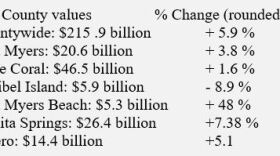A Florida Senate committee, Wednesday, advanced a bill (SB 1402) which aims to place a longstanding federal program that protects wetlands through the Clean Water Act under state control.
Right now, under the federal Clean Water Act, the U.S. Army Corps of Engineers holds permitting authority when it comes to proposed developments on environmentally sensitive wetlands in Florida. This designation is known as “Dredge and Fill Permitting Authority” under Section 404 of the Clean Water Act.
However, a companion bills moving rapidly in both chambers of the Florida Legislature would put such decisions in the hands of the state Department of Environmental Protection. Bill sponsor, Sen. David Simmons, R-Logwood, said that if approved by the EPA, the legislation would eliminate a redundancy in the development permitting process for freshwater wetlands.
“This is permitted by federal law so that the state can administer, without duplication, with federal law itself, the Section 404 permits, but the actual implementation of this and the execution of this will be done as if the DEP is acting as the Corps of Engineers, and will be done in accordance with the requirements of federal law,” said Sen. Simmons. “There will be no lessening of the requirements for these dredge permits.”
Environmental advocates oppose the bill over concerns that it will fast track permitting for development of wetlands. They point to the importance of Florida’s wetland ecosystems as critical habitat for endangered species, as a source of fresh drinking water, and as a vital aspect to Florida’s natural infrastructure in the event of hurricanes and floods. One acre of wetlands can store about one million gallons of water. The Conservancy of Southwest Florida’s Amber Crooks said she’s also concerned about the DEP’s ability to take on the additional work.
“We know that they’re already strapped. The growth has already increased and we know just for the state’s program, that they’re having a hard time keeping up with the influx of permitting applications,” said Crooks.
“We’re not sure how they can take on this additional responsibility and DEP has testified that they’re not planning to provide additional money for implementing this program.”
The bill unanimously passed the Senate’s Appropriations Subcommittee on the Environment and Natural Resources. It now heads to the Senate’s Appropriations committee before going to the full chamber for a vote. The House companion bill (HB 7043) is already waiting for a floor vote.
Florida lawmakers considered making this regulatory change back in 2005, but after a detailed analysis decided it would be too costly and too complicated to implement. Crooks worries that is not happening this time around. “We’re not getting a sense that there’s much analysis going into this,” said Crooks.
“This sort of came out of left field. By the time the environmental community had heard of this proposal resurfacing now 13 years later, was when these bills already passed at least one of its committees. So it was a bit of a surprise. A majority of the environmental community is raising red flags and concerns about these bills going forward.
Crooks said that only Michigan and New Jersey have taken similar action. “Almost immediately there were some issues on ensuring that those states had actual up-to-date federal laws they were enforcing and questions about whether they were really implementing the Clean Water Act up to the standards that they should be and also about how to handle endangered species issues.”
If the measure ultimately passes in the Florida Legislature, it would still need approval from the U.S. EPA before the permitting authority could change hands from a federal agency to a state entity.
The Conservancy of Southwest Florida has more detailed information about the bill including an action alert at: https://www.conservancy.org/our-work/policy/land/wetland-protection.








